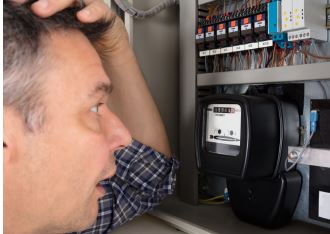-
Home
-
Customer resources
- Disconnection and restriction
Disconnection and restriction
Learn more about how to avoid disconnection of your electricity, gas or water supply and the rules in place to protect you.
If you're having difficulty paying your bill and are facing disconnection, contact your provider and ask how they can help. All providers have a customer assistance program, and must offer you payment options if you need it. They can also help you access emergency assistance (Energy Accounts Payment Assistance (EAPA) or Water Payment Assistance Scheme (PAS) vouchers). If you act early, you can avoid disconnection.
If you have been disconnected, you will normally have to pay something towards your account or agree to a payment plan for the provider to reconnect you. If your provider agrees for you to pay the bill over time, they will normally try to send a field officer to your home the same day to reconnect the supply. Sometimes, particularly if you have been disconnected at the pole or you contact the provider late in the afternoon, you may not be reconnected until the following day.
If you have been disconnected and can't work out an arrangement with your supplier to get reconnected, call us on 1800 246 545. Our services are free, fair and independent.
Electricity and gas disconnection rules
There are rules about when and how a provider can disconnect your electricity or gas supply. These are set out in the National Energy Retail Rules.
Generally electricity or gas disconnection occurs at the meter box. In the case of electricity, if the meter is not accessible or the supply has been reconnected without the provider’s authority, the provider may arrange a pole top disconnection.
If you have an overdue bill and need a payment plan, you need to contact your retailer. An energy provider cannot disconnect your supply for non-payment if you are on their hardship program or if you have advised them you are experiencing financial difficulty, unless in the previous 12 months, the provider has twice offered you a payment plan or assistance under their hardship program.
Your electricity or gas supply cannot be disconnected:
- when you have an appointment with a community agency about EAPA vouchers and your provider has been given the appointment details
- when you or someone in your house runs a life support machine that uses electricity and your energy provider is aware of this (it will be noted in your account details)
- on a Friday, Saturday, Sunday, a public holiday or any day before a public holiday
- before 8am and after 3pm
- where the debt is for less than $300 and you have agreed with the retailer to pay this amount
- on the days between 20 December and 31 December (both inclusive) in any year
- when you are adhering to a formal payment plan
- when you have a formal complaint, related to the arrears, with your retailer or with EWON (either your retailer or EWON need to have confirmed with you there is a hold on disconnection activity).
Your electricity or gas supply can be disconnected when:
- you don't contact the retailer to open an account or to pay for energy you've used
- you don't pay an overdue amount
- you don't agree to any of the retailer's payment plan offers
- you don't keep to your payment plan, you miss a payment or your payment is late
- your payment plan is cancelled
- you don’t maintain contact with the provider (for example, you don’t let them know you have an EAPA appointment or you’ve made a payment)
- you haven't paid a security deposit
- the wiring or gas piping in your home is unsafe.
Before they disconnect
Providers must follow a number of steps before they disconnect you, including issuing you with at least two written notices - a reminder and a disconnection warning. The disconnection warning notice can be issued at least 6 business days after the reminder notice. The disconnection warning notice should state:
- the reason/s for disconnection
- the date when the warning period ends and that payment must be made during the warning period
- the reconnection procedures and that there is a charge for reconnection
- that you can contact EWON and include our contact details
- the phone number for the retailer and the distributor.
After they send you the disconnection warning notice, your energy provider must make reasonable attempts to contact you, to give you the chance to make a payment or enter into a payment arrangement. They may contact you by phone, fax or in person.
Fees
In most circumstances, you’ll have to pay a disconnection and reconnection fee. Fees are set by the Australian Energy Regulator and not by the companies themselves. There may also be extra fees if you want to be reconnected after hours (after 3pm weekdays) or you have been disconnected at the pole rather than the meter box.
If the provider has disconnected you by mistake, or without taking reasonable steps to contact you, they should not charge you a fee.
Shortened collection cycle
If you have received a reminder or warning notice for two bills in a row, your retailer can place you on a shortened collection cycle. This means that instead of receiving two written notices, the retailer only has to send you one. They still have to make attempts to contact you. And they also have to warn you that you are at risk of being placed on the shortened collection cycle, before they send you a notice for the second bill in a row.
If you pay the next three bills in a row by the due date, you will be removed from the shortened collection cycle.
If you are experiencing financial difficulties or are on the retailer’s hardship program, you cannot be placed on the shortened collection cycle.
Water restriction
Water is usually not disconnected because of the impact on public health. However, water can be restricted to allow only a very limited flow to the property.
Hunter Water and Sydney Water have customer contracts that regulate restriction practices. The following guidelines apply to customers of these two water suppliers.
Grounds for restriction
Hunter Water and Sydney Water can restrict if you:
- fail to pay any amount due
- fail to ensure access to the meter
- have non-compliant plumbing work
- breach a relevant law
- discharge unauthorised trade waste water
- discharge chemicals that pose a health risk
- fail to install a backflow prevention device when required
- use recycled water improperly
- do not comply with the terms of the customer contract.
Notification of restriction
Unlike electricity and gas, water suppliers are not required to follow a legislated notification schedule. Sydney Water and Hunter Water will notify customers in writing and may attempt to contact you by phone or in person before the water is restricted.




